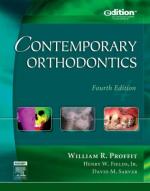|
This section contains 746 words (approx. 3 pages at 300 words per page) |

|
Orthodontics is a specialized branch of dentistry dealing with "malocclusions," or bad bite. The "bandolet," created in 1723, was the first known orthodontic apparatus; the most common modern orthodontic appliances include braces, retainers, tooth guards, and splints, all used to correct tooth and jaw problems such as crossbite, protruding or misaligned teeth, protruding or retruding jaw, tooth grinding, speech difficulties, and temporomandibular joint dislocation. Teeth-straightening and extraction to improve alignment of remaining teeth has been practiced since early times (Leonardo Da Vinci perhaps made the first written observation regarding teeth and bite); today, approximately one in every 50 people (25% being adults), is being treated by an orthodontist.
Orthodontics as an independent science began developing in the l880s. The first comprehensive treatise on dentistry, The Surgeon Dentist, published in 1728 by Pierre Fauchard (1678-1761), devoted an entire chapter to tooth irregularities and ways to correct them. In 1757, French dentist Bourdet wrote...
|
This section contains 746 words (approx. 3 pages at 300 words per page) |

|


